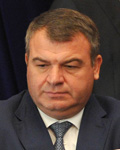|
Medvedev founded and chaired a presidential anti-corruption commission after he became Russian president in 2008. In the same year, Russia released a national anti-corruption guideline and an anti-corruption law. According to these regulations, a Russian official can only accept gifts that are valued less than 3,000 rubles ($91).
 |
|
Russia's Defense Minister Anatoly Serdyukov (XINHUA/AFP) | Putin re-launched the anti-corruption process in 2012 after his reelection. On May 19, 2012, he issued a presidential order, reducing half the number of official vehicles in the country. Many high-ranking government officials, including former Defense Minister Anatoly Serdyukov, lost their positions one after another for corruption. Serdyukov conducted military reform after assuming office, and outsourced the Russian military's logistics business to civilian enterprises. According to reports from Russian media, the defense service company attached to the Ministry of Defense sold buildings and land owned by the ministry at prices that were much lower than market prices. Some officials obtained private gains during the transaction. Another military-attached logistics service company also was suspected of extracting capital from the state budget. The two cases caused losses of over 6.7 billion rubles ($204 million). As a result, Serdyukov became the first minister who lost his position due to corruption since 1991.
Yelena Borisovna Skrynnik, former Minister of Agriculture, also was under investigation for suspicion of embezzling federal funds of about 39 billion rubles ($1.19 billion) when she served as general manager of Russia's agriculture leasing company. Roman Panov, Prime Minister of Russia's Perm Territory and a former Deputy Regional Development Minister of Russia, was arrested for the embezzlement of funds earmarked for the 2012 APEC Summit that were as high as 93 million rubles ($2.83 million). Several officials from public health, education and aviation departments were also removed from office because of corrupt practices.
Putin swore to expel corrupt officials from departments of political power in his state-of-the-nation address on December 12, 2012. After that, Russia issued a stream of new laws and regulations on anti-corruption.
On December 21, 2012, Russia's State Duma passed a bill prohibiting civil servants and their family members from owning overseas assets (real estate and deposits in banks) within prescribed time limits, which includes an official's tenure and three years after leaving office. Offenders will be imposed fines up to 10 million rubles ($304,000), or will be sentenced to prison for up to five years, and they cannot take public office within three years thereafter. Since 2013, government officials and family members must declare and explain their sources of income if they spend money that exceeds the sum of family income in the previous three years upon purchasing real estate, land, vehicles, securities and stocks. Related information should be published on government websites, if they do not involve state secrets. Some officials have resigned from public office because of the bill.
Putin signed another bill on April 2, 2013, requiring that Russian officials declare their purchased real estate, land, cars, luxuries, stocks and assets overseas, and explain how the expenses were paid for.
Not easy
Although every Russian president targets corruption, the problem persists, causing many Russians to lose confidence in their government. In 2010, only 21 percent of Russians believed their president and government can effectively curb corruption. In this context, many are increasingly thinking about the underlying causes of Russia's escalating corruption.
The major obstacle to Russia's anti-corruption efforts is the emergence of an alliance of corrupt bureaucrats who resist the government's anti-corruption policies in order to protect their private interests. The energy industry is currently Russia's economic backbone and a major source of its fiscal revenues. Most high-ranking managers in the industry are current or former senior government officials. Bureaucrats and business oligarchs form a complicated vested interest group. At the same time, supervision and monitoring of corrupt activities in Russia are insufficient. Therefore, the anti-corruption initiatives of the Russian Government and leaders can hardly be implemented to the letter.
The stubborn habit of corruption has become endemic in Russia, which is the reason why President Putin regards anti-corruption as one of his priorities and has tried to strike down corruption since returning to the Kremlin. Russian society has a common understanding that serious corruption is a burden that severely hinders the country's economic development. To realize Putin's vision, Russia must be prepared to strengthen systemic reform and media supervision in a long-term war on corruption.
The author is a research fellow with the Institute for International Strategic Studies at the Shanghai Institutes for International Studies
Email us at: yanwei@bjreview.com |
